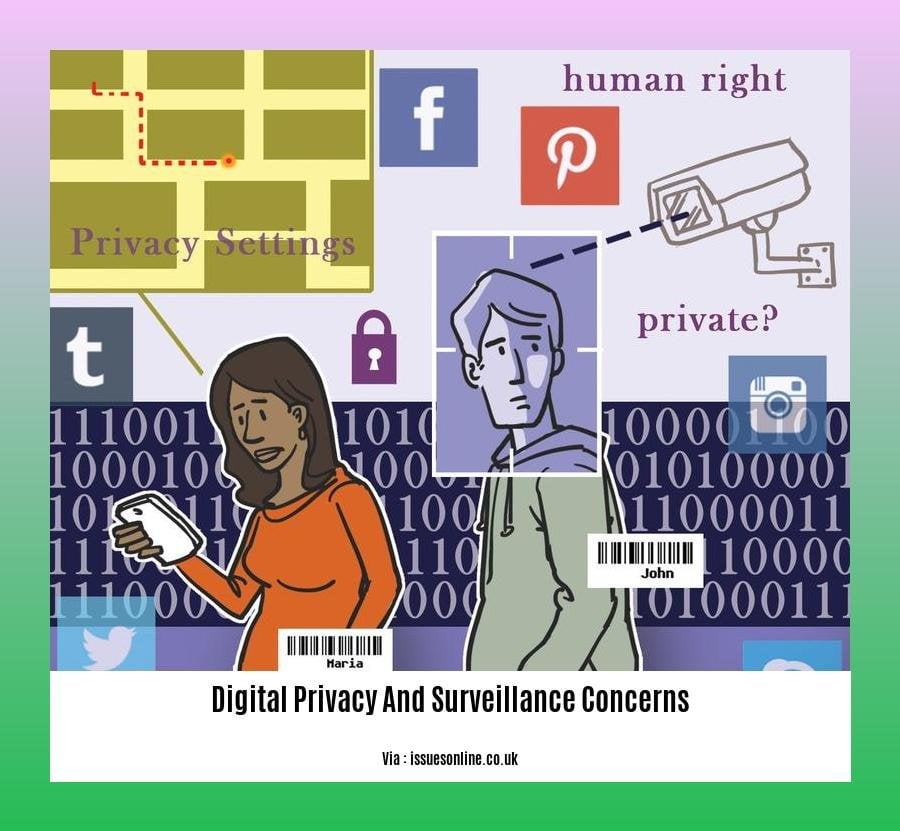In the digital age, where technology permeates every aspect of our lives, the intersection of digital privacy and surveillance concerns has become a labyrinthine maze. As we navigate this intricate landscape, it’s imperative to unravel the complexities surrounding data collection, privacy issues on the internet, and the potential implications for our civil liberties. [Navigating the Labyrinth: Digital Privacy and Surveillance Concerns in the Modern Age] delves into this critical topic, illuminating the ethical dilemmas and practical challenges that lie ahead as we strive to balance innovation and the protection of personal information.
Key Takeaways:

- Digital surveillance is a growing threat to our privacy and civil liberties.
- Spyware and surveillance can infringe on our rights to privacy, free speech, and association.
- Balancing public safety with individual rights is crucial in implementing digital surveillance measures.
- The collection, use, and sharing of personal information through digital surveillance raise ethical concerns.
Digital Privacy and Surveillance Concerns
In the digital age, we rely on technology for almost every aspect of our lives. However, this convenience often comes at a price: our digital privacy and surveillance concerns.
What is Digital Surveillance?
Digital surveillance refers to the systematic monitoring and collection of personal data using digital devices and networks. This data includes our online activities, location, communications, and even physical characteristics.
Why is Digital Privacy Important?
Our digital privacy is essential for several reasons:
- Protects our personal identity: Our online information can reveal sensitive details about us, such as our health, financial status, and political views.
- Preserves freedom of expression: Digital surveillance can inhibit our ability to express ourselves freely and access information without fear of reprisal.
- Upholds democratic values: Mass surveillance undermines principles of transparency, accountability, and individual autonomy.
How Does Digital Surveillance Impact Us?
Digital surveillance can have significant consequences for individuals:
- Chilling effect: People may self-censor or avoid certain activities online due to fear of being monitored.
- Data breaches: Personal information can be stolen and misused, leading to identity theft, financial losses, and reputational damage.
- Erosion of trust: Widespread surveillance can erode trust in governments, companies, and institutions.
Balancing Security and Privacy
While digital surveillance can be necessary for national security and law enforcement, it’s crucial to find a balance between public safety and individual rights. This balance should prioritize:
- Transparency and accountability: Clear guidelines and oversight mechanisms to ensure surveillance is used ethically.
- Minimization: Limiting the collection and retention of personal data to what is strictly necessary.
- Consent: Individuals should have the right to consent to the collection and use of their data.
Conclusion
Digital privacy and surveillance concerns present complex challenges for society. By raising awareness, advocating for strong data protection laws, and holding institutions accountable, we can protect our digital privacy and preserve our civil liberties in the digital age.
Stay vigilant: online data protection worries are on the rise. Increasing monitoring of digital activity poses privacy threats from surveillance.
Privacy Issues With Technology
In the age of the internet, our digital footprints are now more visible than ever before. Governments and corporations wield powerful surveillance tools that can track our every move online and offline.
This raises concerns about the erosion of our privacy and the potential for abuse by those in positions of power. Here are some key issues to consider:
Surveillance for Control and Oppression
Digital technologies allow governments and corporations to monitor our activities on an unprecedented scale. This can lead to the suppression of dissent, the targeting of activists, and the erosion of civil liberties.
Data Monetization and Privacy Tensions
Companies collect vast amounts of data about our online behavior, which they use to target us with advertising and other forms of commercial exploitation. This monetization of our personal information creates tensions between our right to privacy and the commercial interests of data-driven businesses.
Public Opinion and Regulation
Surveys show that the majority of Americans are concerned about privacy issues with technology and support stricter regulations on the use of surveillance technologies. This public concern is driving lawmakers and regulators to take action to protect our privacy in the digital age.
Key Takeaways:
- Digital surveillance technologies pose significant threats to our privacy.
- Governments and corporations can use surveillance for control and oppression.
- Data monetization practices create tensions between privacy and commercial interests.
- Public concern is driving demands for stricter privacy regulations.
Citation:
OHCHR. (2022, September 16). Spyware and surveillance: Threats to privacy and human rights growing, UN report warns.

FAQ
Q1: How does digital surveillance threaten privacy?
A1: Digital surveillance can monitor online activities, track locations, collect personal data, and potentially lead to control and oppression.
Q2: What are the main concerns about digital privacy?
A2: Lack of control over personal data, mistrust in social media executives, and the monetization of data by companies raise significant privacy concerns.
Q3: How does digital technology contribute to privacy issues?
A3: Modern digital technologies include surveillance capabilities that governments and corporations use for control and oppression, leading to increased privacy concerns.
Q4: What are the implications of data collection for privacy?
A4: Data collection practices can intrude on personal privacy, potentially leading to the erosion of privacy rights and the misuse of sensitive information.
Q5: How can we address digital privacy concerns?
A5: Implementing regulations, raising awareness, and advocating for privacy protections are crucial steps towards addressing the concerns surrounding digital privacy and ensuring the preservation of individual rights.










